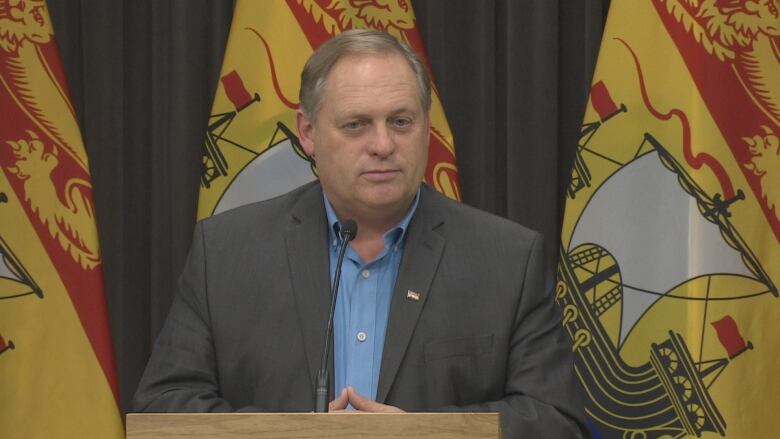Flood recovery costs could hit $80M, minister says
Tax relief and a little help with cleanup costs 'the right thing to do,' Andrew Harvey says

A major flood that destroyed homes and cottages in the St. John River basin could cost taxpayers up to $80 million, the environment and local government minister says.
The provincial government could cover between $10 million and $15 million of those costs, said Andrew Harvey. The federal government would cover the remainder.
"It's hard to know right today, but based on the properties that could be affected, that's our overall top number projection, somewhat," Harvey said in an interview with Information Morning Fredericton.
None of the damagesustained bycottages would be covered by any taxpayer dollars.
- What cottage owners need to know about flood recovery assistance
- Will 'special one-time' financial assistance for flooded cottage owners become permanent?
- Some Grand Lake cottagers won't be able to rebuild after flood, says MLA
As cleanup continues three weeks after the flooding began, the government is estimating as many as 12,000 properties could be affected by the disaster.
The province is running a disasterfinancial assistance program through the federal government, which helps individuals, small businesses and municipalities that suffered property damage.
And earlier, the Liberal government announced it would provide up to $6,100 each to recreational property owners, but the money can be used only for cleanup not for any structural damage.
"It's based on the uptake of the programs and the needs of the citizens," said Harvey.
Theprovince is also offering free water testing to property ownersimpacted by the flood.
As well, anyone whose property was damaged can have it reassessed"as it stands today" and get a refund on 2018 property taxes,Harvey said.
"It's the right thing to do," Harvey said.
A review of 'everything'

Harvey said the province will eventuallycompile a review similar to the ice storm of 2017 in the Acadian Peninsula, a three-day ice storm that caused widespread power outages and claimed two lives.
The report made 51 recommendations aimed at strengthening the government's future responses to natural disasters and emergencies.
The report will look at what caused the damage in the first place, including why so much water came through the watershed.
"We need to do that to be prudent and look at all of those factors that caused this much damage," he said.
Cottagers interviewed by CBCNews said this was the first flooding they'd suffered since their buildings went up, some as far back as the 1930sand not on floodplains.
"We need to look at every idea and concern and every suggestion and take it at face value and don't dismiss anything," Harvey said.
New regulations
Debris cleanup continues to be a major challenge following the unprecedented flood. Harvey said another task will be the rebuilding of homes, businesses and cottages that were destroyed.
The province announced Wednesday it will introduce new requirements for people applying for watercourse aNormal
nd wetland alteration permits to rebuildnear rivers, streams and brooks.
The so-called WAWA permits are already required for construction within 30 metres of waterways, but they'll now be conditional on builders showing the project can withstand flood damage in the future.
"These floods are not one in 100 years anymore," he said.
Listen to "Preparing for the next devastating flood," the fifth episode of The Hook, a podcast fromCBCNew Brunswick. You can listen to the full episode by clicking on theCBCPodcastspageor bysubscribing iniTunes.
With files from Jacques Poitras












_(720p).jpg)


 OFFICIAL HD MUSIC VIDEO.jpg)
.jpg)



























































































